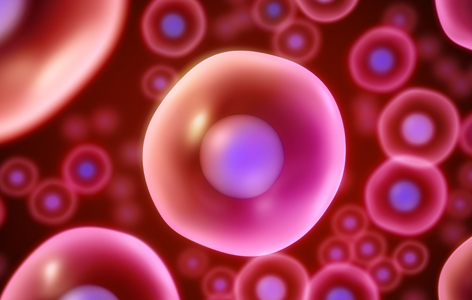Home page Description:
New test better predicts which patients are less likely to be cured by standard treatments.
Posted On: December 19, 2016

Image Caption:
Leukemia stem cells (pictured here) were discovered 22 years ago by PM Senior Scientist Dr. John Dick, one of three lead authors of the present study.
Acute myeloid leukemia (AML) is a blood cancer that is notoriously difficult to treat: standard therapies fail in up to 60% of young adults and 85% of older adults diagnosed with the disease. Consequently, new prognostic tools are urgently needed to better distinguish between AML patients who can be cured with standard treatments and those who would benefit more from being treated with aggressive experimental therapies.
A team led by PM Affiliate Scientist Dr. Jean Wang has developed a new test that could help doctors make better treatment decisions for AML patients. The test builds upon the discovery that leukemia stem cells (LSCs), which make up only a small part of the leukemic cells in AML, are responsible for not only initiating and maintaining disease, but also for its recurrence after treatment.
To develop the test, Dr. Wang and colleagues examined the genetic content of blood or bone marrow samples from 78 AML patients. They identified a set of 17 genes specific to LSCs that could be used to calculate a score, called the LSC17 score, for each patient. The LSC17 score predicts whether a patient will respond to standard therapy. Patients with high LSC17 scores were at higher risk of poor outcomes—such as cancer recurrence—if they were treated with standard therapy.
“The LSC17 score is the most powerful predictive and prognostic biomarker currently available for AML, and is the first stem cell-based biomarker developed in this way for any human cancer,” says Dr. Wang. Plans are under way to further evaluate the score in a clinical trial at the PM Cancer Centre.
Follow this link to watch a video of Dr. Wang describing the team’s work.
This work was supported by the Ontario Institute for Cancer Research, Genome Canada, the Ontario Genomics Institute, the Canadian Institutes of Health Research, the Canadian Cancer Society, the Terry Fox Foundation, The Princess Margaret Cancer Foundation, the Leukemia & Lymphoma Society of Canada, the Stem Cell Network, the Ontario Ministry of Health and Long-Term Care and the Deutsche Forschungsgemeinschaft. JE Dick holds a Tier 1 Canada Research Chair (CRC) in Stem Cell Biology. PW Zandstra holds a Tier 1 CRC in Stem Cell Bioengineering.
Ng SW, Mitchell A, Kennedy JA, Chen WC, McLeod J, Ibrahimova N, Arruda A, Popescu A, Gupta V, Schimmer AD, Schuh AC, Yee KW, Bullinger L, Herold T, Görlich D, Büchner T, Hiddemann W, Berdel WE, Wörmann B, Cheok M, Preudhomme C, Dombret H, Metzeler K, Buske C, Löwenberg B, Valk PJ, Zandstra PW, Minden MD, Dick JE, Wang JC. A 17-gene stemness score for rapid determination of risk in acute leukaemia. Nature. 2016 Dec 7. doi: 10.1038/nature20598.
A team led by PM Affiliate Scientist Dr. Jean Wang has developed a new test that could help doctors make better treatment decisions for AML patients. The test builds upon the discovery that leukemia stem cells (LSCs), which make up only a small part of the leukemic cells in AML, are responsible for not only initiating and maintaining disease, but also for its recurrence after treatment.
To develop the test, Dr. Wang and colleagues examined the genetic content of blood or bone marrow samples from 78 AML patients. They identified a set of 17 genes specific to LSCs that could be used to calculate a score, called the LSC17 score, for each patient. The LSC17 score predicts whether a patient will respond to standard therapy. Patients with high LSC17 scores were at higher risk of poor outcomes—such as cancer recurrence—if they were treated with standard therapy.
“The LSC17 score is the most powerful predictive and prognostic biomarker currently available for AML, and is the first stem cell-based biomarker developed in this way for any human cancer,” says Dr. Wang. Plans are under way to further evaluate the score in a clinical trial at the PM Cancer Centre.
Follow this link to watch a video of Dr. Wang describing the team’s work.
This work was supported by the Ontario Institute for Cancer Research, Genome Canada, the Ontario Genomics Institute, the Canadian Institutes of Health Research, the Canadian Cancer Society, the Terry Fox Foundation, The Princess Margaret Cancer Foundation, the Leukemia & Lymphoma Society of Canada, the Stem Cell Network, the Ontario Ministry of Health and Long-Term Care and the Deutsche Forschungsgemeinschaft. JE Dick holds a Tier 1 Canada Research Chair (CRC) in Stem Cell Biology. PW Zandstra holds a Tier 1 CRC in Stem Cell Bioengineering.
Ng SW, Mitchell A, Kennedy JA, Chen WC, McLeod J, Ibrahimova N, Arruda A, Popescu A, Gupta V, Schimmer AD, Schuh AC, Yee KW, Bullinger L, Herold T, Görlich D, Büchner T, Hiddemann W, Berdel WE, Wörmann B, Cheok M, Preudhomme C, Dombret H, Metzeler K, Buske C, Löwenberg B, Valk PJ, Zandstra PW, Minden MD, Dick JE, Wang JC. A 17-gene stemness score for rapid determination of risk in acute leukaemia. Nature. 2016 Dec 7. doi: 10.1038/nature20598.




